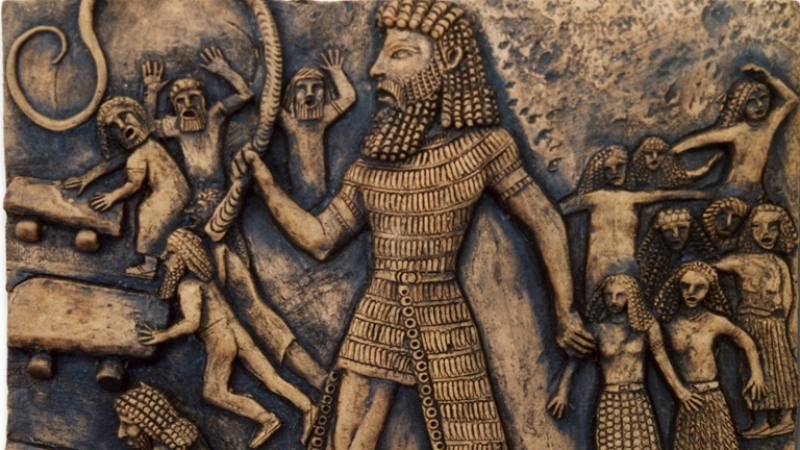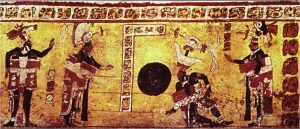Imagine grasping eternal life in your hands just to watch it disappear before your eyes. Or imagine that the hardest journey of your life is finally over and you have failed to obtain the very thing you wanted most. Our story begins in a land known as Mesopotamia about four thousand years ago. There one of the earliest cities in history existed, called Uruk, which lies on the Euphrates river near the Persian Gulf. This city became famous for being the site of one of the earliest piece of literature ever created, The Epic of Gilgamesh. Although in this story Gilgamesh, the hero, is the king of Uruk, he is also partly a god. He is one part mortal and two parts divine, and as such, he was a being full of beauty and courage, but also as terrifying as a wild bull.1 The Epic of Gilgamesh is an adventure story with many exciting parts. However, one of the central themes of the epic revolves around Gilgamesh’s search for immortality.2

Gilgamesh’s quest for everlasting life begins when his friend Enkidu unexpectedly dies. The trauma from losing his dear friend scares Gilgamesh. Enkidu isn’t just a dear friend to Gilgamesh, Enkidu is like a brother to him. The gods had originally created Enkidu to help stop Gilgamesh from stirring up trouble, but after they met, they got along so well that they became brothers and went on countless journeys together. With Enkidu’s death, Gilgamesh is so terrified by the idea of death that he goes on a long journey to beat the inevitable. On this journey he meets several people who tell him that his journey is pointless and that he won’t find what he is searching for. But Gilgamesh doesn’t listen, and pushes forward regardless of what people say. He is so determined to find Utnapishtim, the only human who had been made immortal, but doing so he ignores what his body really desires, sleep. He completely exhausted himself to the point where he was near dying.
After a long and dangerous journey, Gilgamesh finally meets Utnapishtim, who tells Gilgamesh, “There is no permanence. Do we build a house to stand forever, do we seal a contract to hold for all time?…. When the Anunnaki, the judges, come together, and Mammetun the mother of destinies, together they decree the fates of men. Life and death they allot but the day of death they do not disclose.”3 Even with the wise information that Utnapishtim tells him, Gilgamesh is still in pursuit of immortality, so Utnapishtim decides to put him up to a test. The test requires him to stay awake for six days and seven nights, but Gilgamesh ultimately fails the test. Utnapishtim had a kind heart and told him that, instead of obtaining immortality, he might obtain youthfulness. There was a plant in the sea that can restore one’s youth. So of course Gilgamesh doesn’t hesitate in jumping in to find this plant. He finally gets the key to youthfulness, and decides to rest and relax, because he believes his troubles are over. With his guard down, a snake snatches the plant away from him and the plant is gone forever.
Gilgamesh finally accepts this fate, and goes back to the land of Uruk. Although he never got immortality, he did get what he needed. Throughout the story the same line recurs about what is he suppose to do after Enkidu’s death, which is just to live his normal, mortal life.4 Once he returns, he writes on a wall the story of his long journey for immortality. The world may never know if there was a real living, breathing ruler named Gilgamesh, but at least for now we have a legendary one that will last forever.
- Jerry Bentley, Herbert Ziegler, and Heather Streets Salter, Traditions & Encounters: A Brief Global History Volume 1. 4th edition (New York: McGraw Hill, 2015), 5. ↵
- Tzvi Abusch, “The Development and Meaning of the Epic of Gilgamesh: An Interpretive Essay,” Journal of the American Oriental Society 121, no. 4 (2001): 614. ↵
- Nancy K. Sanders, The epic of Gilgamesh (Harmondsworth, Middlesex: Penguin Books, 1964), 23. ↵
- Nicola Vulpe, “Irony and the Unity of the Gilgamesh Epic,” Journal of Near Eastern Studies 53, no. 4 (1994): 280. ↵



93 comments
Elizabeth Maguire
Before reading this article I had never heard of Gilgamesh or his story. It is quite surprising to read how motivated he was to find immortality. But because he did not take care of himself, a snake took the flower that can restore the youth of somebody from him. The article was an interesting and thought evoking read.
Malleigh Ebel
The legend of Gilgamesh was fairly interesting. Gilgamesh (one part human, two parts divine) searches selflessly for immortality after his friend Enkidu dies and he wishes to bring him back. He proceeds on an epic journey in which he learns to accept the impermanence of life and time. Although he ultimately comes back to his kingdom in Mesopotamia empty-handed, he learned a valuable lesson in the circle of life and writes this story into a wall.
Raul Vallejo
It is always amazing to read and to read about stories and tales that were written by ancient civilizations and they actually managed to live out to today. One of the best things about these ancient stories is that there is always a moral or a lesson to be taught in the wild story about gods. the lesson here is that instead of being scaring of death and doing everything you can avoid it, it is inevitable and just make the best out of your time alive.
Amelia Hew
From this story, I understand that losing someone important in your life hurts and sometimes even scares you like what happened to Gilgamesh. To prevent that he searches for immortality but is immortality even worth it? you live while you were forced to watch people around you wither and die, living a life of eternal loneliness. The fact of how long you’ll live is not what determines your value, it’s the stories you tell the world and how you make it a legend that was passed on from generations to generations like the story of Gilgamesh.
Kristina Tijerina
I have always heard the summarized version of Giglamesh’s quest for immortality, however I had never known that his reason for doing so was because of the death of his dear friend, Enkidu. I think Giglamesh’s story is very interesting, because he went on this exhausting journey in hopes that he could turn himself immortal because he was scared of death. It’s truly fascinating how Giglamesh was very persistent throughout his quest for immortality even after the people around him told him it was pointless. And even though his journey for immortality, something non-existent, was actually ridiculous and pointless, it was a journey necessary for him to come to terms with his fate.
Joel
what was the plant’s name from the sea?
Debbie Rochester
It’s a beautiful story mainly because Gilgamesh is true to himself. ..through his grief he was still able to pursue his desires and return home peaceful. Competent from his knowledge of experiencing life for himself and not listening solely to the advice of others in the end he found his truth. Seek the truth and it will make you free. Good story. His truth is his truth. It’s a relative concept.
Yazmin Garza
Gilgamesh should have listened to the people that told him his mission was a waste of time. I am curious to know how the rest of the Epics of Gilgamesh unravel, and if Gilgamesh fails any other times. He does not seem very smart but he does seem very stubborn, seeing that he exhausted every option before giving up and going back, so I have to assume that not all of his stories end in success.
Eric Ortega Rodriguez
This article is very fascinating, this is the first time that I hear about the story of Gilgamesh. It is quite surprising to read how motivated he was to find immortality. I found it bizarre how they told him to go look for a plant that would give him youth forever, but because he did not take care of himself, I snake took it from him. Which serves as a reason to not overwork or bodies. Overall, this was a very fascinating article and makes the audience want to look more into the life of Gilgamesh. Good work.
Maya Mani
The concept of death has always been scary. However the concept of infinite life has also been scary for me, even after beginning to fathom concept of infinity, I get so frightened! Thousands of years, then hundreds of thousands of years, then millions of years of being alive, and it just never ends! So I think Gilgamesh’s search for immortality is almost pointless for many reasons, but at least he was eventually able to accept his face.